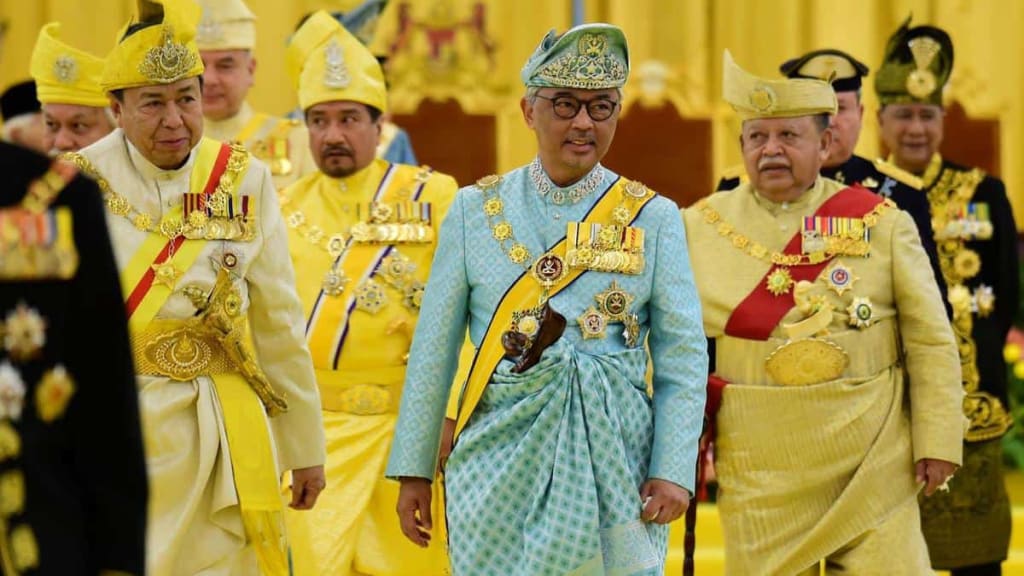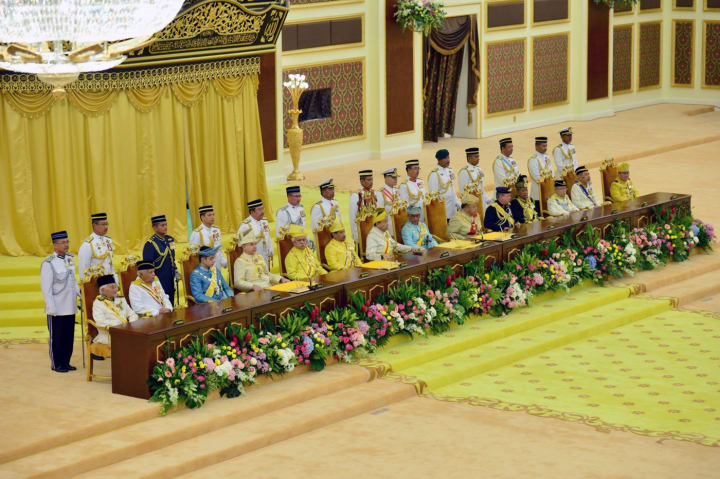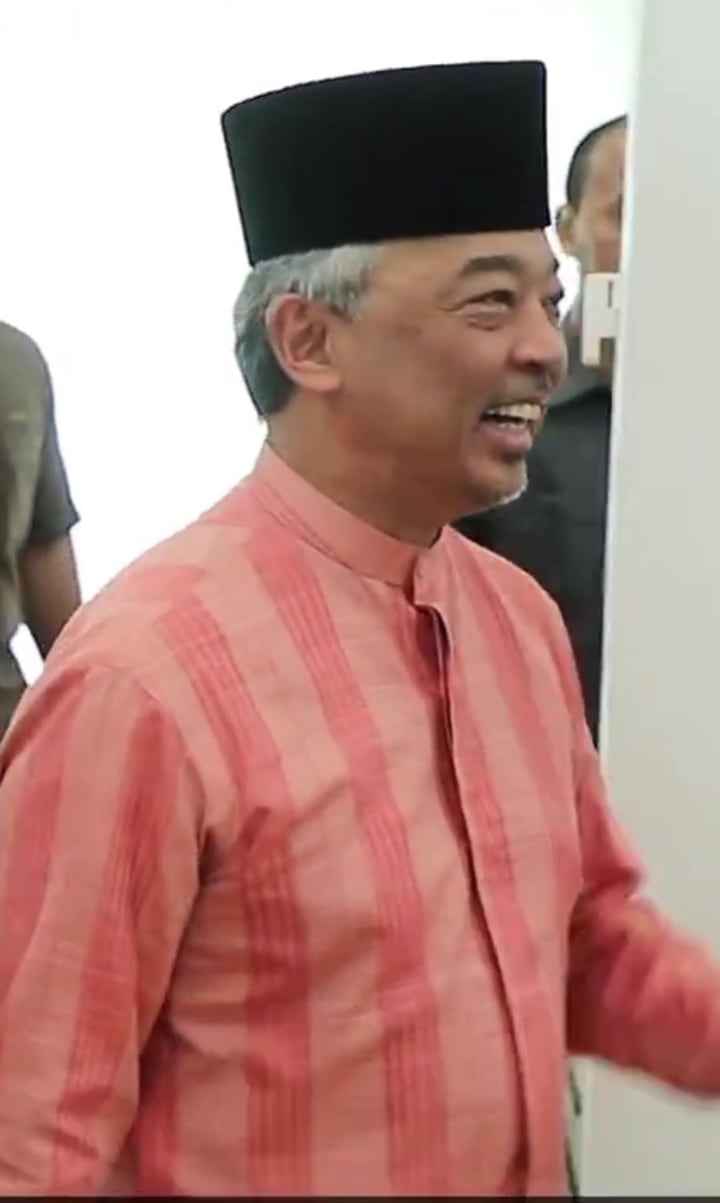
Since its independence from the British in 1957, Malaysia as we know it today has functioned as a Constitutional Monarchy. This means that the country is run by a Government elected by the people but ruled by a monarch whose powers are limited by the law.
To give you a clearer example, this is exactly the same way things are run in the UK with Boris Johnson as the PM of the elected Government and Queen Elizabeth as the Constitutional Monarch.
However, while the UK has just one queen who is expected to rule for life, Malaysia has nine kings who share the throne. One of only four elective monarchies in the world today, Malaysia’s unique ruling system stands out even among such an exclusive group.
In this article, we will take a look into how nine kings have been able to harmoniously rule a single country for over six decades.
The Role of The Kings
In every constitutional monarchy, one elected leader serves as Head of Government and one monarch serves as Head of State. Malaysia is no different in this sense. Despite having nine kings, only one can serve as the country’s Head of State at a time.
Malaysia is made up of 13 states and 3 Federal Territories. Nine of these states are ruled by their own kings. These nine kings are known as Sultans. The Sultans essentially have the same powers as any other constitutional monarch albeit limited only to their respective states.
As Islam is the official religion of Malaysia, every Sultan is the head of Islam in the state they rule. They also have the power to pardon criminals and make formal appointments on the advice of the Government. Aside from the smaller scope, this is really no different from any other constitutional monarch.
Among these nine Sultans, one is chosen as Malaysia’s Head of State. Known as the Yang di-Pertuan Agong or the Agong for short, this person is recognised as Malaysia’s “main” ruler. The Agong is recognised as the Commander in Chief of Malaysia’s armed forces and is the Head of Islam in the remaining states which do not have a Sultan.
Unlike other monarchs, the Agong does not keep his role for life nor is he succeeded by his heir. Instead, the Agong is only able to rule the country for a term of five years. At the expiration of his term or if he dies in office, another one of the remaining kings will succeed him.
This has allowed the throne of Malaysia to be shared evenly among nine different royal families. The question that remains, is how the line of succession is determined.
How is the next King chosen?

As mentioned earlier, Malaysia’s throne is not hereditary. The Agong is not succeeded by his closest male heir as is the norm with other patriarchal monarchies. Instead, one of the other Sultans will be appointed to the role.
This is done through a meeting of the Conference Of Rulers. This is essentially a council made up of the nine Sultans and four State Governors. The Governors are the leaders of the states that do not have a royal family. Although they are part of the Conference of Rulers, they are not eligible to become Agong nor do they have any say in the appointment of the next King.
Thus, the decision to appoint the next Agong lies solely among the 9 Sultans. Although officially an election done by secret ballot, there is a general agreement as to the order of who gets to have the throne next. When Malaysia’s current monarchy system was first established, the earlier generation of Sultans agreed to take their turns based on how long each of them had ruled their respective states at that point.
However, this voting process cannot be chalked down to a mere formality. In cases where a Sultan is unable or unwilling to take the role of Agong, the other Kings can vote on their next choice. The other Kings can also use the ballot to bypass the order should they feel that the upcoming Sultan is unable to effectively rule the country.
Once a Sultan is chosen as Agong, he will appoint a regent to take over some of his duties as a state ruler. At the same time, another Sultan will be chosen as the Deputy Agong. The Deputy Agong’s role will be to fill in for the elected King should he be indisposed for any reason.
Should the Agong die or resign however, the Deputy Agong will not automatically succeed him. Instead, he will continue as an interim ruler until the Conference of Rulers reconvenes and votes on another Agong. That being said, it is generally a custom to appoint the next Sultan in line as the Deputy.
A Sultan is also allowed to serve as the Agong for a second time provided that every other State gets their turn first. This is usually a very long wait and thus, this has only been done once in Malaysia’s history.
Are The States Also An Elective Monarchy?

While the Yang di-Pertuan Agong is appointed as Malaysia’s King, the smaller state monarchies generally follow the more conventional line of succession. In the vast majority of the states, the title of Sultan is hereditary. Generally, the next Sultan is always the closest male heir of the previous one. If the heir is not of age, a regent will be appointed to rule in the meantime.
However, two states do not follow this hereditary line when passing on the title of Sultan. In the state of Perak, the role of Sultan is passed between three different families. In the state of Negeri Sembilan, the Sultan is chosen by a council from among any male member of their royal family.
Regardless of how each state chooses their Sultans, the general expectation is that they would rule their state for life in a similar fashion to other monarchs. That being said, there have been two occasions where a Sultan’s tenure ended prior to their deaths. In 2009, Sultan Ismail Petra was removed from power after a massive stroke left him unable to rule. In 2018, Sultan Ahmad Shah abdicated his throne citing his old age and ill health. Thus, nobody is forced to actually remain in the role and if necessary, they can be removed.
How Democratic Is It To Have Nine Kings In One Country?
While there are those who view the very concept of a monarch as being undemocratic in itself, Malaysia’s unique monarchy has actually served as a boon to the country’s democracy. Unlike other monarchs, no single person can rule Malaysia for more than five years at a time, nor can a single family permanently lay claim to the country’s throne.
Malaysia’s monarchy has often served to keep it’s Government in check while at the same time remaining accountable itself. Unlike other countries where it is extremely different to remove a monarch, Malaysia’s various Sultans have the power to remove the Agong if required. The fact that even a King can be removed from power if he does not do his job right shows a level of democracy and accountability not seen in other monarchies.
On top of that, Malaysia’s rulers are not above the law. In Malaysia, the Agong and Sultans can be prosecuted or sued in civil matters. To put into perspective how this compares to other monarchies, even the Queen of England is immune from any manner of criminal prosecution or lawsuits.
Malaysia’s monarchy has also served as a symbol of ceremony and solidarity among the country’s multi-racial population. Serving to reinforce the value of tolerance and unity amongst the diverse population, the monarchy has remained the one constant throughout decades of change and political instability.
Malaysia’s unique monarchy has shown that it is possible to have a constant and unbroken institution in a modern democracy. If done right, any monarchy can be both a symbolic and democratic asset to a country and no country seems to be able to do it better than Malaysia. It serves as a shining example of how no one person can be bigger than the institution.
About the Creator
Isa Nan
Written accounts of life, death and everything in between






Comments
There are no comments for this story
Be the first to respond and start the conversation.